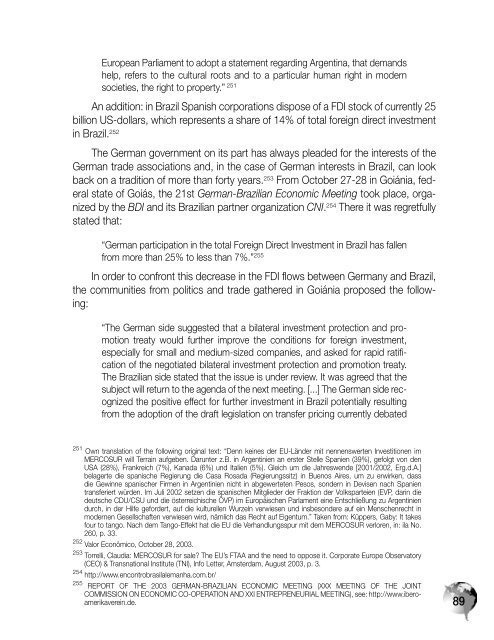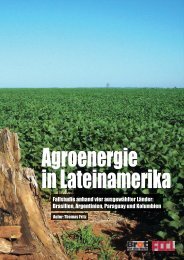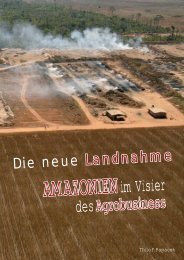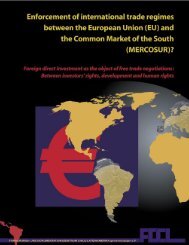Download - FDCL
Download - FDCL
Download - FDCL
You also want an ePaper? Increase the reach of your titles
YUMPU automatically turns print PDFs into web optimized ePapers that Google loves.
European Parliament to adopt a statement regarding Argentina, that demands<br />
help, refers to the cultural roots and to a particular human right in modern<br />
societies, the right to property.” 251<br />
An addition: in Brazil Spanish corporations dispose of a FDI stock of currently 25<br />
billion US-dollars, which represents a share of 14% of total foreign direct investment<br />
in Brazil. 252<br />
The German government on its part has always pleaded for the interests of the<br />
German trade associations and, in the case of German interests in Brazil, can look<br />
back on a tradition of more than forty years. 253 From October 27-28 in Goiánia, federal<br />
state of Goiás, the 21st German-Brazilian Economic Meeting took place, organized<br />
by the BDI and its Brazilian partner organization CNI. 254 There it was regretfully<br />
stated that:<br />
“German participation in the total Foreign Direct Investment in Brazil has fallen<br />
from more than 25% to less than 7%.” 255<br />
In order to confront this decrease in the FDI flows between Germany and Brazil,<br />
the communities from politics and trade gathered in Goiánia proposed the following:<br />
“The German side suggested that a bilateral investment protection and promotion<br />
treaty would further improve the conditions for foreign investment,<br />
especially for small and medium-sized companies, and asked for rapid ratification<br />
of the negotiated bilateral investment protection and promotion treaty.<br />
The Brazilian side stated that the issue is under review. It was agreed that the<br />
subject will return to the agenda of the next meeting. [...] The German side recognized<br />
the positive effect for further investment in Brazil potentially resulting<br />
from the adoption of the draft legislation on transfer pricing currently debated<br />
251 Own translation of the following original text: “Denn keines der EU-Länder mit nennenswerten Investitionen im<br />
MERCOSUR will Terrain aufgeben. Darunter z.B. in Argentinien an erster Stelle Spanien (39%), gefolgt von den<br />
USA (28%), Frankreich (7%), Kanada (6%) und Italien (5%). Gleich um die Jahreswende [2001/2002, Erg.d.A.]<br />
belagerte die spanische Regierung die Casa Rosada (Regierungssitz) in Buenos Aires, um zu erwirken, dass<br />
die Gewinne spanischer Firmen in Argentinien nicht in abgewerteten Pesos, sondern in Devisen nach Spanien<br />
transferiert würden. Im Juli 2002 setzen die spanischen Mitglieder der Fraktion der Volksparteien (EVP, darin die<br />
deutsche CDU/CSU und die österreichische ÖVP) im Europäischen Parlament eine Entschließung zu Argentinien<br />
durch, in der Hilfe gefordert, auf die kulturellen Wurzeln verwiesen und insbesondere auf ein Menschenrecht in<br />
modernen Gesellschaften verwiesen wird, nämlich das Recht auf Eigentum.” Taken from: Küppers, Gaby: It takes<br />
four to tango. Nach dem Tango-Effekt hat die EU die Verhandlungsspur mit dem MERCOSUR verloren, in: ila No.<br />
260, p. 33.<br />
252 Valor Econômico, October 28, 2003.<br />
253 Torrelli, Claudia: MERCOSUR for sale? The EU’s FTAA and the need to oppose it. Corporate Europe Observatory<br />
(CEO) & Transnational Institute (TNI), Info Letter, Amsterdam, August 2003, p. 3.<br />
254 http://www.encontrobrasilalemanha.com.br/<br />
255 REPORT OF THE 2003 GERMAN-BRAZILIAN ECONOMIC MEETING (XXX MEETING OF THE JOINT<br />
COMMISSION ON ECONOMIC CO-OPERATION AND XXI ENTREPRENEURIAL MEETING), see: http://www.iberoamerikaverein.de.<br />
89









